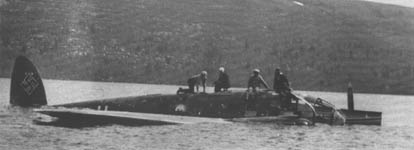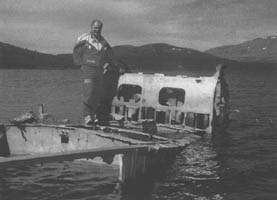On 2 June 1940, RAF No. 263 Gladiator-equipped Sqn was in combat in northern Norway. On that day, the order to evacuate the scandinavian country was issued, and the biplane fighters were soon in action, covering the withdrawal of British troops from Narvik.
In the early afternoon two Gladiators, flown by Plt Off Louis Jacobsen and Plt Off Wilkie took off to patrol the area between Narvik and the Swedish border. They intercepted some Bf 110, and in the quick dogfight that followed Wilkie was shot down by German ace Helmut Lent.
The Germans disappeared into the clouds, and Jacobsen continued his mission alone. While flying along the border, the RAF pilot sighted and formation of enemy bomber over Bjornfell, which he attacked shooting down on Dornier Do 17 from 4.(F)./ObdL. Jacobsen was then attacked by Ju 88s (most probably Bf 110s) tand furiously defended himself in series of head-on attacks. During the dogfight, the British pilot seized his chance and closed within 50 yd of a Heinkel He 111, firing a three second burst and shooting it down.
He was then, again, surrpounded, by Bf 110s and the remaining He 111s. The Gladiator received hits in the oil cooler and the windscreen was covered in oil. Jacobsen was in that moment attacking a second Heinkel, so he fired almost blindly at the enemy. The German bomber plunged to earth with both its engines on fire, crashing over the Swedish border. Now low on fuel, Jacobsen headed back to base at low level.
One of the He 111 shot down was 1H+CK (WNr 5607) of 2./KG 26, which made an emergency landing on the Norwegian side of Lake Grövelsjön. All crew members survived and where picked up by an Heinkel He 115 the following day. According to Hakans aviation page, the Heinkel is still visible today.

Image of the He111 in Lake Grövelsjön the day after the emergency landing.

The remains of the He111 in Lake Grövelsjön today Source: Hakans Aviation Page.
One of the He 111 shot down was 1H+CK (WNr 5607) of 2./KG 26, which made an emergency landing on the Norwegian side of Lake Grövelsjön. All crew members survived and where picked up by an Heinkel He 115 the following day. According to Hakans aviation page, the Heinkel is still visible today.


The remains of the He111 in Lake Grövelsjön today Source: Hakans Aviation Page.
Post war research credited Jacobsen with a fourth kill: a Ju52/3m of KGzbV 107 was chased over the Swedish border by a Gladiator, and fired on by Swedish defence forces. It is not clear whether AA or Jacobsen shot down the aircraft, however the British pilot was credited with four kills for this mission.
Despite such gallant episodes, there was nothing No. 263 Sqn could to prevent the Germans from kicking British forces out of Norway. The squadron continued its patrol until 7 June, when it embarked on HMS Glorious together with Hurricanes of No.46 Squadron. In 13 days of operations, the biplane squadron was engaged in 72 combats, claiming 26 victories (post war research suggest 35), loosing only two Gladiators.
Tragically, the aircraft carrier HMS Glorious was attacked and sunk on 8 June byt the heavy cruiser Scharnorst and Gneisenau, with the loss of 1,519 lives, including all men from No. 263 Sqn.

No comments:
Post a Comment